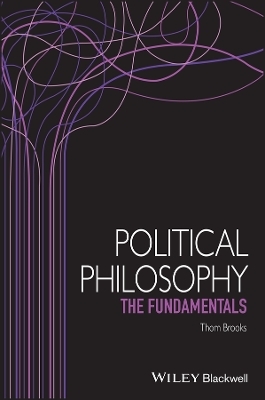
Political Philosophy
Wiley-Blackwell (Verlag)
978-1-4051-8937-8 (ISBN)
- Noch nicht erschienen (ca. März 2025)
- Versandkostenfrei
- Auch auf Rechnung
- Artikel merken
A wide-ranging and up-to-date survey of the leading ideas and debates in political philosophy
Political Philosophy: The Fundamentals introduces core topics within the field by engaging students in seminal works in both contemporary philosophy and the history of political thought. Requiring no previous background in the subject, this clear and comprehensible textbook equips readers with the necessary context for understanding different philosophical perspectives.
Through eight succinct chapters, Thom Brooks highlights important contributions made from political philosophers from the past and present to connect the history of political thought with ongoing debates. Readers gain insights into various conceptions about the nature of freedom, different ways of understanding equality, longstanding debates over punishment, questions concerning the value of human rights, issues of global justice and severe poverty, approaches to handling climate change and much more.
Helping readers develop informed opinions on central issues, Political Philosophy: The Fundamentals:
Discusses divergent views about the different forms and limits of freedom that philosophers have defended over time
Provides a historical perspective of contemporary understandings of human rights and their origins in natural law and natural rights
Illustrates the multiple ways that freedom has been understood, including commonalities and differences
Examines various ways of implementing equality and assessing their merits
Covers influential work by John Rawls that envisions a well-ordered society governed by principles of justice
Featuring carefully selected further readings in each chapter, Political Philosophy: The Fundamentals is essential reading for undergraduate students and general readers interested in the historical development and present-day debates over political ideas and institutions.
Thom Brooks is Professor of Law and Government at Durham University and Visiting Fellow at Yale Law School. His publications include Global Justice: An Introduction, Climate Change for an Endangered World, Rawls's Political Liberalism and The Global Justice Reader, Revised Edition.
Preface.Introduction: What is political philosophy?.Chapter I: Freedom.Chapter II: Rights.Chapter III: Justice.Chapter IV: Democracy.Chapter V: Punishment.Chapter VI: Feminism.Chapter VII: Global Justice.Chapter VIII: Environmentalism.Conclusion.Bibliography.Index..Introduction: What is political philosophy?.The book will begin with a general essay meant to introduce the reader to the subject of political philosophy and offer a clear picture of the kinds of questions political philosophy asks and how it aspires to provide answers. In general, my focus will not be exclusively on contemporary political philosophy. Instead, my focus might be best characterized as on contemporary political philosophy, but informed by its history..Chapter I: Freedom .The first chapter will examine the topic of freedom. My main focus will be on the debate between those who hold negative views of freedom (e.g., Hobbes, Berlin), those who hold positive views of freedom (e.g., Green, Nussbaum), and alternative views (e.g., MacCallum, Mill, Frankfurt). First, that I am highly sympathetic to the 'positive' view of freedom and I will offer a defence of this view. Secondly, I will include a discussion of Sen's and Nussbaum's capabilities approach (in my view, too often neglected in books of this kind) and include it as one variant of positive freedom..Chapter II: Rights.The second chapter will focus on rights. It will begin by discussing the beginning of rights theorizing, arising with natural rights theorists (e.g., Hobbes, Locke) and its development and connection with modern human rights. Other important figures, such as Wesley Hohfeld, will be discussed leading to a sympathetic view of Leif Wenar's several functions theory of rights. Following Wenar, my argument will be that there is way out of the interest theory versus will theory debate. This way out is a recognition that rights have more than one function, an insight we can find in earlier writers, such as Hegel and T. H. Green, and developed much further since by Wenar. Throughout the chapter, I will raise several questions: Why are rights important? How do we know a right when we see one? Are there too many rights?.Chapter III: Justice
| Erscheint lt. Verlag | 6.3.2025 |
|---|---|
| Reihe/Serie | Fundamentals of Philosophy |
| Verlagsort | Hoboken |
| Sprache | englisch |
| Maße | 152 x 229 mm |
| Themenwelt | Geisteswissenschaften ► Philosophie |
| ISBN-10 | 1-4051-8937-1 / 1405189371 |
| ISBN-13 | 978-1-4051-8937-8 / 9781405189378 |
| Zustand | Neuware |
| Haben Sie eine Frage zum Produkt? |
aus dem Bereich


